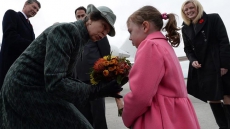VANCOUVER - Dr. Nadine Caron says she hears difficult stories every day from some of her Indigenous patients in rural British Columbia facing a diagnosis of cancer.
They tell her why they didn't have a family physician to go to first, why they didn't trust the medical system when they started having symptoms and that no one told them about screening opportunities.
Caron has already identified through research that First Nations in the province are less likely to survive a cancer diagnosis than non-First Nations in B.C.
Now, through a new position created at the University of British Columbia, she plans to tackle how to improve not only cancer outcomes but also wellness among Indigenous Peoples.
"I think part of it is, how do we change our health-care system so that we celebrate, as a country, our Indigenous people — so that we actually ensure that our health-care services are a safe space for them that they feel empowered to use, that they have the right to use and benefit from, just like all Canadians," she said in an interview.
Caron was Canada's first female First Nations general surgeon.
During a ceremony on Monday, she was named the inaugural First Nations Health Authority chair in cancer and wellness at the university.
Caron, who lives in Prince George, B.C., provides surgical cancer care to rural populations, while also serving as co-director of UBC's Centre for Excellence in Indigenous Health.
Over the course of her five-year term in the position, she plans to take a holistic approach that acknowledges how colonization, racism, marginalization and poverty have led to a disparity in health outcomes.
Caron said she will focus on collecting and reporting Indigenous cancer experiences and outcomes, and better understanding the system's responsiveness to Indigenous cancer care needs.
Dr. Dermot Kelleher, dean of UBC's faculty of medicine and vice-president of health, said in a statement the school is delighted with her appointment.
"The centuries-old knowledge of the importance of wellness, integral to Indigenous traditional learnings, is now a critical principle informing twenty-first century health care."
For Caron, the appointment is about improving the lives of some of her patients. While lack of access to services is a major contributing factor, the historical treatment of First Nations, Metis and Inuit Canadians has led many to distrust the system.
She told the story of one woman she worked with last year, who was diagnosed with breast cancer.
"I explained from the medical point of view what I strongly recommended, which included surgery and would give her an excellent chance of surviving," Caron said.
The woman asked if it would be possible to do the surgery at Caron's clinic, but it wasn't equipped for surgery. Caron tried to convince the woman to go to a different hospital or another medical facility, but she couldn't be persuaded.
"She eventually said she trusted me, she trusted the space our office could provide her," but she couldn't face further involvement with the medical system, Caron said.
"She said that she had had such horrific experiences that she would not go into a hospital."
Caron was the senior author of the first study comparing cancer development and survival between First Nations and non-First Nations people in B.C. in 2017.
In addition to the lower survival rates, the study published in the journal Cancer Causes & Control also revealed some cancers, including colorectal and cervical, are significantly more common among First Nations.
At the same time, overall cancer incidence among First Nations is lower than among non-First Nations residents, it found.
The study has filled in some knowledge gaps, but Caron said there's a dearth of research on Indigenous health in Canada and worldwide.
She said she's come across many questions in her clinical work that led her to search medical literature, only to find the questions hadn't been asked before, or if they had, they'd never been answered.
"I wanted to be someone who would start to address that gap," she said.




